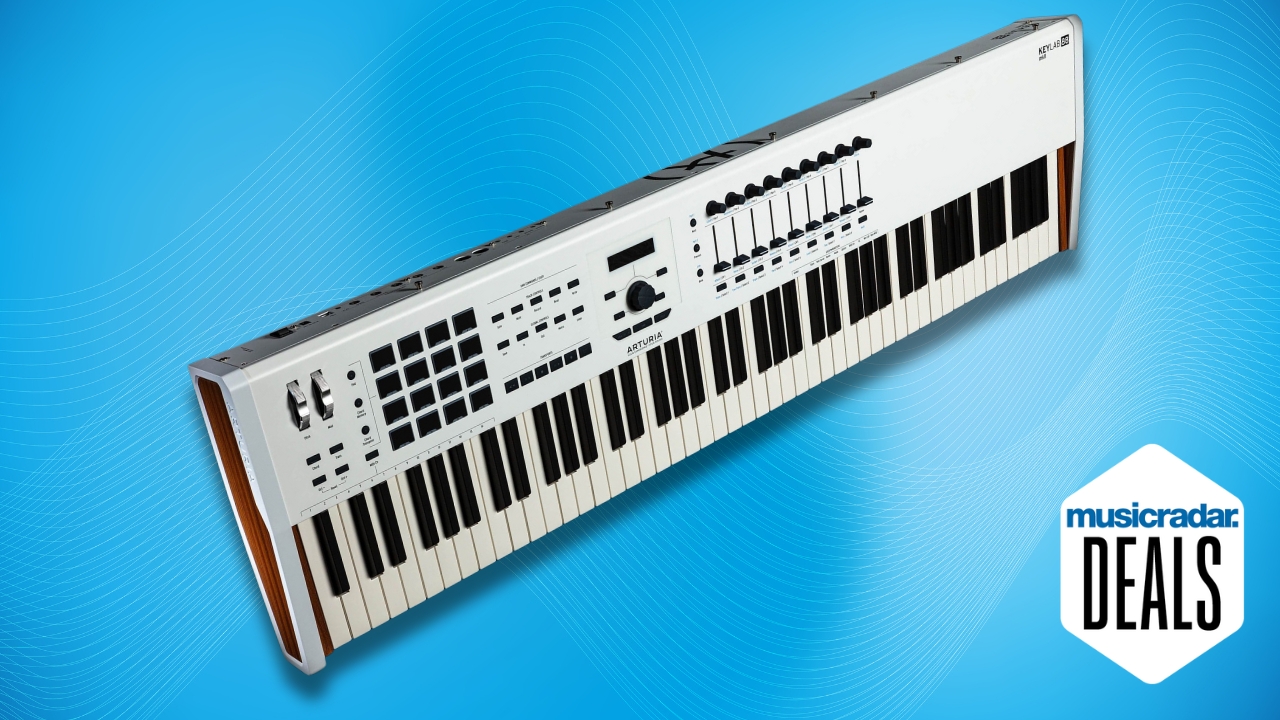Foo Fighters' Nate Mendel: “I’m nearly 50 years old, and seriously, I’m still thinking like a teenager”
Bass veteran on his punk roots, gear haul and making Concrete And Gold

The power of rock compels thee is a phrase that we use a lot around BGM’s secret command bunker, partly because it makes us chuckle as we boil our strings but also because there’s a certain truth hidden in there for bassists of the loud persuasion.
Take Nate Mendel of the Foo Fighters for instance, an affable chap who has called us up to talk about his band’s new album, Concrete And Gold, their ninth in the 23 years since sometime Nirvana drummer Dave Grohl formed the group.
Greg Kurstin would roll with my ideas for a while, before saying ‘Well, if you really want to make it good, try this!
If you’re familiar with the Foos’ big hits - Monkey Wrench, Learn To Fly, Times Like These, Breakout and so on - you’ll know that they specialise in Rock with a capital R, designed for stadiums and beloved of crowds worldwide.
Who’s bigger than the Foo Fighters in this second half of the 2010s, in terms of numbers of gigs played at truly huge venues? No-one in rock apart from U2 and Guns N’ Roses, although Metallica and Iron Maiden equal them in the heavy metal world, and Taylor Swift, Justin Bieber, Adele, Ed Sheeran and the rest of the pop contingent probably outdo them all.
This makes it pretty amusing that all the rock bombast in the world can’t stop a chap from quailing before a producer with a jazz background, like Mendel did earlier this year. (Be assured, I’m not criticising him here: I’m including all of us non-jazzers in the ‘fear of jazz’ demographic…)

“If you’re in the rock world, jazz seems to have a little bit of wizardry, whereas our rules and norms are quite a bit simpler,” chuckles Mendel.
“I was definitely a little nervous going into this album, because our producer Greg Kurstin is such a schooled jazz musician, but I was looking forward to it at the same time, because I want to collaborate with people and come out a better player at the end of it.”
Get the MusicRadar Newsletter
Want all the hottest music and gear news, reviews, deals, features and more, direct to your inbox? Sign up here.
Mendel and Kurstin bonded despite their differing backgrounds, with the producer keen to give the bass a prominent spot in the music.
“I would come in with my ideas and Greg would roll with those for a while, before saying ‘Well, if you really want to make it good, try this!’” recalls Mendel.
“I was coming off two records with [production legend] Butch Vig, who is very particular about timing and making sure that the bass isn’t more complicated than it needs to be. His thing is about making the bass simple, solid and heavy without dragging things out: he does a lot of things in one take.”
Concrete And Gold
Concrete And Gold, on which Mendel and Grohl are joined by guitarists Chris Shiflett and Pat Smear, drummer Taylor Hawkins and keyboardist Rami Jaffee, is a refined bit of work, loaded with Beatles and Queen-influenced textures and the odd acoustic ballad here and there.
“I’m very pleased with it, it’s one of my favourites,” says Mendel. “I stretched out a bit on this one, and switched things up: we got a great sound that I’m really pleased with.”
One of the songs, La Dee Da, begins with a slick fuzzed-up bass part, magicked up by Kurstin and his engineering team.
“That’s not a pedal, it’s Greg using Logic,” says the bassist. “We recorded the dry part in Pro Tools and then they had a second rig set up with Logic for tweaking things and adding effects. It’s funny, because I just got a JHS Four Wheeler pedal, which is a distortion pedal that has a noise gate built in.
“The effect that Greg put on there more or less does the same thing. It’s a great pedal: we just played 10 dates in Europe, and we didn’t get a soundcheck for a single one of them, so I just plugged that pedal in and off we went.”
The bass tone on the album, Logic-ed parts aside, has a bottom-heavy thud that suits the wall of guitars delivered by Grohl and Shiflett, thanks to a switch in strings.
“I ended up playing flatwounds in the studio a lot - that was Greg’s thing,” explains Mendel. “I’ve always liked a live sound on the bass guitar, and I like the notes to ring out fully, but for this record I had a darker, more woody tone and actually it worked out great. Greg was really into that sound, and I came to like it too.”
As is usually the case when big bands on a big budget go into big studios, there was an enviable choice of gear for Mendel to choose from.
“In the studio there were six or seven instruments,” he recalls, “and for the first two or three songs you go through all six or seven, but then you end up picking the one and going with that, because it sounds the best. On this record I mostly used custom shop P-Basses that were made for me in the late-'90s: they’re basically what my signature bass turned into.”

Signature model
Ah yes, the Fender Nate Mendel Precision, available now at £949. Which of the instrument’s specs is uniquely his, we ask?
“It’s a pretty typical P-Bass,” he explains, “but I had different pickups put in, and a thicker bridge. The main thing was trying to get the shape of the neck right. In the batch of 1971 basses that mine came from, I think that they were trying to split the difference between the feel of a Precision neck and a Jazz neck. It’s a little wider than a Jazz neck, which for me feels a little crowded.”
I’ve been shopping a bit, because I haven’t actually bought any new basses in a long time - I’m not much of a gear collector
Four years ago, our tester Mike Hine reckoned, “despite the simplicity of the passive circuitry, the Nate Mendel P-Bass is no one-trick pony. The Badass II bridge, larger and more robust than Fender bridges of old, coupled with the modern Seymour Duncan pickup, help pay tribute to the 71 Precision, while adding a refreshing, modern edge. By Mendel’s own admission, the new technology makes this bass sound better than its archetype.”
We relay this to Mendel and he says, “Obviously I’m biased, but if you’re not going to buy a super-high-end version of a Precision, or a vintage one, I think it’s a good way to go. I love the cosmetics of it: the headstock is very bleached-out blonde and new-looking. I don’t like relic'd instruments: it just seems like cheating to me! I wanted to find the middle ground between a relic'd bass and a bass that looks like it was just made last week.”
Apart from his own Fenders, what else does he have lying around?
“I’m mixing it up right now,” he tells us. “I’ve been shopping a bit, because I haven’t actually bought any new basses in a long time - I’m not much of a gear collector. I played guitar in my solo band for a long time, and then when I came back to bass I really started paying attention to tone and so on, which is why I’ve been shopping for basses lately.”
For amps, Mendel has headed to our side of the pond, he tells us.
“I use Ashdown BTA amps, the solid-state/tube hybrid ones. When I was growing up in the '70s, I played Ampeg SVTs like everyone else: back then, there wasn’t much option. As soon as you could get $1,200 together for a P-Bass and an SVT you were ready to go, right? But I don’t tour with my SVTs because they’re old and finicky, so that’s why I moved to Ashdown, which are readily available and the closest replica to that sound. I also have an awesome distortion pedal with Ashdown, the NM2.”
Tasty gear all round, then. Does Mendel ever fancy a touch of amp-modelling, now that the tech is affordable and ubiquitous?
“I just modelled my SVT sound with a Kemper, actually,” he tells us. “We used the same cab, the same mic and the same control room as we record in to do it. I’m interested to know if it’ll come out the same as the actual rig. I know that for guitars it’s pretty spot-on, but getting the low-end might be a little more difficult to replicate.”

Sting in the tail
It’s all a long way from Mendel’s youth as a punk kid from Richland, Washington. “I just wanted to be in a band,” he remembers, “and there was a guy I was hanging out with at the time who played guitar. I was listening to the Ghost In The Machine album by the Police at the time, and I was hugely into Sting, so when my friend suggested I should play bass I thought it sounded like an awesome idea.”
For my first bass, I got a Steinberger copy by Cort, because it was the '80s, and that was what you did when you were 13 back then!
It certainly was - so what was that first bass? “I got a Steinberger copy by Cort, because it was the '80s, and that was what you did when you were 13 back then!” he laughs.
“I got a little practice amp and we messed around a bit, but that band didn’t last long. After that I got into punk-rock and moved on to an Ibanez Roadstar and a black Kramer, a kind of Travis Bean-style bass. I joined this band called Christ On A Crutch and I bought a P-Bass for $200 from the singer. That’s the one I modelled my signature Precision on.”
And the rest is history. Has Mendel ever gone down into five-string territory? “No!” he chuckles, before pausing to explain. “In our little camp, five-strings are pretty illegal. It’s funny, because I totally understand the value of that fifth string, but it’s just one of those lines that you don’t cross.”
We get it. It’s the ‘punk rules’, right? “Probably, yeah. I know, I’m nearly 50 years old, and seriously, I’m still thinking like a teenager,” he sighs. “Sorry man, some things are just built in.”
He needn’t worry: this is a recurring theme here. We often interview bassists, particularly Americans aged between around 35 and 50, who grew up on punk, and in that environment there were three unbreakable rules for the bass player. One, do not play more than four strings; two, do not play fretless; three, never - ever - play slap bass.
“Oh my gosh... I sort of wish I could slap,” says Mendel. “Its time is back, I think. The other day Taylor, Chris and I were jamming in the rehearsal room on an old U2 tune which has a slap part. It was fun, and the song was better for it. Maybe it’s time to reassess. What’s the opposite of the slap, when you pull up? A pop? Maybe I could do one of those here and there.”
Tour gear
If the next Foo Fighters album has some slap on it, you know where he got the idea. The Foos will be off on tour again in 2018: what basses will he be taking out with him?
“On tour it’s been a bit of a grab-bag recently,” he tells us. “I’ve got a bunch of my P-Basses, a Jazz, an old Gibson Ripper, an Epiphone Jack Casady and a Rickenbacker, which I think must be a 4001.
Taylor Hawkins called me from a guitar store and said ‘Hey man, there’s a beautiful white Rickenbacker here and you should come and get it’
“When I bought the Ricky I didn’t know the difference between a 4001 and a 4003, but our drummer Taylor Hawkins called me from a guitar store and said ‘Hey man, there’s a beautiful white Rickenbacker here and you should come and get it’. He’s been trying to get me to buy a Rickenbacker for ever. I’m curious to see which one I actually have!”
The Foo Fighters’ music, designed for arenas as it is, must be too bottom-heavy for a Ricky, surely?
“I plugged it in for a few songs in rehearsal recently, and it wasn’t really appropriate for what we’re doing,” he nods, “but it still sounded awesome! I’ve never really sat down and figured out which basses sound best for which songs, so I’m really looking forward to doing that. I’ll have some time to really think about it when we get together to rehearse for the next tour. I have a rack of old basses that I think might sound good. I’ll try them out for different songs. Maybe Learn To Fly will sound best with a Guild Starfire, who knows?”
He concludes: “Thankfully my bass tech Geoff Templeton is willing to nerd out on this as much as I am. He’s going to fly out here in a couple of weeks and we’re going to go through everything - pickups, strings, amps - and just dive into it for a couple of days. We’re going to get real geeky with it.”
Sounds like our ideal day out - anyone fancy a trip to Washington…?


“I can write anything... Just tell me what you want. You want death metal in C? Okay, here it is. A little country and western? Reggae, blues, whatever”: Yngwie Malmsteen on classical epiphanies, modern art and why he embraces the cliff edge
“You're by far the best guy that we've tried. I would love to have you in the band”: So why did Trent Reznor turn down Richie Kotzen for Nine Inch Nails?










